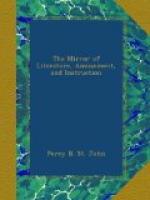Little is known of Shakspeare’s earlier years, except that he was sent to the free school at Stratford, where he acquired the rudiments of the learned languages; that he was never a distinguished classic is certain, but it is equally certain that he must have been acquainted with the Greek dramatists by the use of translations, though he may not have had scholarship enough to study them in the original. So many parallel passages might be drawn from this source, that the task would be an endless one; besides the fact is so well known and admitted, that it would be unnecessary. “We find him,” says Mr. Pope, “very knowing in all the customs of antiquity.” In Julius Caesar, Coriolanus, and other plays where the scene is laid at Rome, not only the spirit but the manners of the ancient Romans is exactly shown, and his reading in the ancient historians is no less conspicuous. It is well known at the universities of this country, that on any public examination, be the play either tragic or comic, the students are frequently required to produce parallel passages from the writings of Shakspeare: now it might indeed with some reason be supposed that occasionally the same ideas would present themselves to different minds, and where two writers are equally well acquainted with the nature of man, and equally skilled in analyzing his passions, it might well, I say, be supposed, that such true and acute observation would suggest similar ideas, and perhaps even the same method of defining them. Yet when this similarity is frequent instead of occasional, when the unusual peculiarity of the sentiment renders it startling and suspicious, then the above supposition becomes too extensive even for prejudice to admit. Such however is the case here, and so the matter stands between Shakspeare and the ancient dramatists. Even some of the machinery he has made use of is not his own. Thus, the seemingly ingenious introduction of “The Play” into Hamlet, is borrowed from an old Greek drama, where Alexander, the tyrant of Pharos, is struck with remorse for his crimes upon viewing similar cruelties to his own, practised upon the stage.




